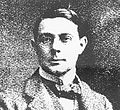|
1926 North Cumberland by-electionThe 1926 North Cumberland by-election was held on 17 September 1926. The by-election was held due to the succession to the peerage of the incumbent Conservative MP, Donald Howard. It was won by the Conservative candidate Fergus Graham.[1] VacancyThe by-election was held due to the succession to the peerage of the incumbent Unionist MP, Donald Howard. He had been MP here since winning the seat in 1922. Election historyCumberland North was created for the 1918 general election. At that election, the Unionist candidate, endorsed by the Coalition Government, was returned unopposed. The first actual electoral contest occurred in 1922 when Howard narrowly held the seat for the Unionists, in a 2-way contest with the Liberal. At the 1923 general election, Howard again narrowly held off the new Liberal challenger, R.D. Holt. At the 1924 general election, a Labour Party candidate intervened for the first time. This damaged Holt's prospects and Howard was easily re-elected; 
Candidates
CampaignPolling Day was set for 17 September 1926. Liberal divisionsIn 1926, the Liberal Party was internally divided between the supporters of party leader H.H. Asquith and parliamentary party chairman David Lloyd George. The 1926 General Strike had seen the two men take differing positions on the issue and Asquith publicly criticised Lloyd George's position. Holt had never been either a supporter of Lloyd George or the interventionist social liberal policies he had advocated in the past or was again advocating. Holt was a member of the 'Liberal Council' a body of Asquithian Liberals intent on frustrating Lloyd George.[5] Although the ailing Asquith was still nominally the Liberal Party leader, increasingly Lloyd George was regarded as the leader in waiting. Therefore the decision of Lloyd George to neither visit the constituency during the by-election nor to issue a letter of support to Holt's candidacy, did not help the Liberal campaign. ResultThere was a swing of 4.3% from Unionist to Liberal, but not a big enough swing to take the Liberals to victory. The Labour Party vote share went up.
AftermathThree years later at the 1929 general election, there was a Graham/Holt re-match with a new Labour candidate. Graham was again the victor, despite a further swing of 3.8% to the Liberals;
Graham remained the member until his defeat by a Liberal in 1935. He later served as MP for Darlington from 1951-59. Holt did not stand for parliament again. References
|
||||||||||||||||||||||||||||||||||||||||||||||||||||||||||||||||||||||||||||||||||||||||||||||||||||||||||||||||||||||||||||||